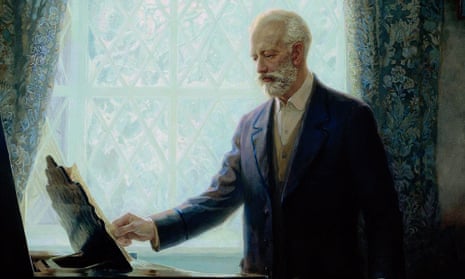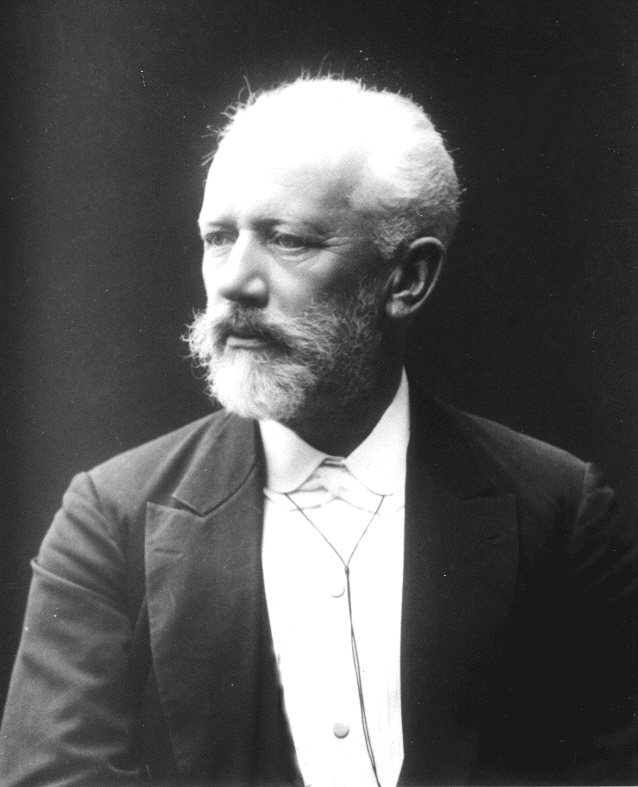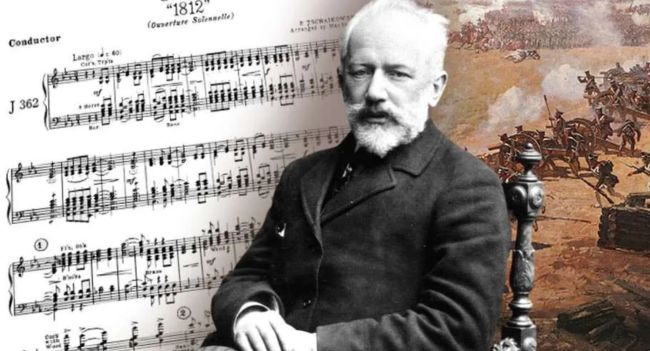Even though many of Pyotr Ilyich Tchaikovsky’s beloved masterpieces like Swan Lake, Romeo and Juliet and the 1812 Overture are regularly heard in concert halls, an argument can be made that the 19th-century Russian composer’s works remain in some ways underappreciated. Indeed, Philip Ross Bullock, author of the 2016 biography, Piotr Tchaikovsky, argues that the composer’s popularity has actually worked against him.
“He is undervalued but perhaps overexposed in some ways,” said Bullock, a professor of Russian literature and music at Oxford University’s Wadham College. “His very popularity, these warhorses, the First Piano Concerto, the Pathetique Symphony [which the CSO will perform Oct. 7-9], become so familiar that people stop hearing them in original ways.”
A member of the academic advisory board of the International Tchaikovsky Society, Bullock offers other reasons for the under-assessment of the composer. For starters, Tchaikovsky (1840-1893) was once subject to what the scholar called a “moral squeamishness” — a distancing by certain academics and others because of his homosexuality and now-outdated notions of how his private life affected his music. “I think that’s not been true for a long time, academically speaking,” Bullock said. “We’ve learned to rehear him.”

Second, Tchaikovsky was a more modern composer than some might think. Mahler was another composer who was discounted for decades after his death in 1911, and then starting in the 1950s and ’60s with the efforts of Leonard Bernstein and others, he began to be seen as a modern master. “Mahler conducted Tchaikovsky at the Vienna Opera House and at the Met when he came to the United States,” Bullock said. “Mahler learned to be Mahler by listening to what Tchaikovsky did to symphonic form.” In his Sixth Symphony, for example, Tchaikovsky broke from tradition and put the movements in the “wrong” order, much as Mahler did in his Ninth Symphony.
“But we always forget to put Tchaikovsky in that place in music history as someone who took us from the 19th century,” he said, “and then ushered in the symphonic practices of Mahler, of Elgar, in many ways, of Shostakovich in the Russian tradition and Sibelius in the Finnish tradition.”
Finally, Tchaikovsky was his own worst enemy. He was self-deprecating about his abilities as a composer. “It’s all rubbish,” Bullock said. “He was a brilliant symphonist.” But the self-criticism, often taken out of context, has affected the way critics view his work.
Among the qualities that have made Tchaikovsky’s music so memorable is his gift for melody. Notable examples can be found across his output, especially what Bullock called his “extraordinary lyrical outpourings” in many of his slow movements, such as that in the Symphony No. 5. The composer wrote 10 operas and more than 100 art songs, and the expressive qualities heard in those pieces often carry over to his instrumental works, as indicated by such markings as “cantabile,” “cantando” or “espressivo.”
Bullock also praised Tchaikovsky’s “winning way” with titles, programs (a preconceived theme or narrative) and particularly, hints of programs, where the composer deliberately withheld details from the audience. “So he engages our capacity as a listener to imagine,” he said. Romeo and Juliet and Francesca da Rimini (an 1876 ode to the famed story from Dante’s Divine Comedy) clearly have narratives, but Tchaikovsky’s programmatic intent for the Fifth and Sixth symphonies remains unclear, despite scholars’ eager efforts to uncover it. “What’s fascinating is the way that Tchaikovsky can use that hint of a story, hint of a personality, to make us do the work, to fill in the gaps and to imagine while we’re listening.”

Although Tchaikovsky’s music is overtly romantic in many ways, he had strong ties to the Classical era, and his favorite composer was Mozart. “When he got to see the original score of Don Giovanni, he was completely transfixed by the connection he had to the 18th century,” Bullock said. Tchaikovsky’s opera The Queen of Spades contains an intermezzo borrowed from a Mozart piano concerto, and the Orchestral Suite No. 4 (Mozartiana) is an arrangement of four works by the composer’s hero. “I think his interest in these classical forms of the 18th century, and his interest in charm, delight, order, proportion — all these things we think of with the 18th century — is often misunderstood because we tend to see him through a romantic, 19th-century prism.”
Igor Stravinsky, who turned to neo-classical music in the 1920s, was fascinated by Tchaikovsky. “It’s maybe that we have evolved a performing tradition that emphasizes the heart-on-sleeve romanticism of Tchaikovsky’s work,” Bullock said, “but sometimes we mishear or misunderstand or are not shown the works that would allow us to hear this very different side of him.”
Piotr Ilyich Tchaikovsky is obviously one of my favorite classical composers, one of the most famous Russians in the West, and the author of some of the saddest and most beautiful melodies ever written. On November 6, 1893, 130 years ago, he died in Moscow, a controversial death that is still suggested as suicide, officially accidental, although there is another strong current that he was induced to kill himself. In any case, after finishing his final composition, the Sixth Symphony (Pathétique), he is said to have drunk a glass of unboiled water, contracting cholera. Was it that or poison? How would he have come to this?

Tchaikovsky’s personal life, which he struggled to keep private, is famously on record as troubled. His sexuality was seen as a problem in a Russia that is still repressive today, so his transparent sensitivity in his melodies, the various attempts to end his life, an impulsive and complicated marriage, a dramatic and platonic relationship with his patroness are some of the elements that contributed to an image of a complex author, in constant conflict. Current historians question the century-old narrative, claiming it has been exaggerated or misinterpreted.
Born into a traditional military family on May 7, 1840, Tchaikovsky received a musical education from the age of 5 but was expected to pursue a career as a civil servant when he grew up (something he did, earning a degree in law and working as a lawyer for a few years). ) and has always been very attached to his sister, Alexandra, and twin brothers Anatoly and Modest. His connection with Alexandra was so great that he was completely attached to his nephews, in particular, Vladimir Davydov, ‘Bob’, who was his confidant towards the end of his life.
Son of a mother of French and German origin, which would later be pointed out as “less Russian” in his work, the composer has always maintained an interest in music, which is why, when possible, he joined the St Petersburg Conservatory, where he received formal teaching in composition. At the conservatory, he participated in the nationalist movement led by the Russian composers of the group known as ‘The Five’ and graduated in 1865, abandoning law completely. His music, in Russia, was considered very ‘Western’ (and in the rest of the world, essentially ‘Russian’) because the principles governing melody, harmony, and other fundamentals were different. Still, it was a quick hit.
Experts point to Overture 1812, written in 1880, as his most important piece. For me, of course, it’s his ballets, but Swan Lake in particular, from 1877. Overture 1812 has the undeniable nationalist streak of being inspired by Russia’s victory over Napoleon in 1812, which ends with the iconic celebration of cannon shots, but the melancholy melody of the swans is superior to me.
His unhappy and hasty union with Antonina Milyiukova – a way of silencing the conservative society that still does not accept homoaffective people – marked much of the composer’s adult biography as it led to the emotional instability of both (themes of films and books).

In addition to operas, and the three definitive ballets, Tchaikovsky composed six symphonies, a Violin concert, and two Piano concerts, his first Piano concert being one of the most famous and beloved ever composed. We can say that Tchaikovsky has always been, even unintentionally, pop. In the year that marks the 130th anniversary of his death, he also registers the year of his last composition, the Sixth Symphony (‘Pathétique’), which he dedicated to his nephew Vladimir Davydov.
Structured in just 6 days, the sad symphony moved the author himself who wrote that he cried copiously while working on it, even though he also recorded his doubts about being able to compose it. When he finished, he was euphoric. “You cannot imagine how happy I feel in the conviction that my time has not yet passed and work is still possible,” he wrote to Bob. Tchaikovsky himself conducted the premiere on October 28, 1893, and considered it his best work, which he called “the most sincere of all my creations”. It is because of this pride and happiness that many claim that his sudden death, just nine days later, was suspicious. While officially accidental, others maintain that the symphony is his farewell letter, especially as although the first three movements are optimistic in expression, the fourth and final part sounds darker and more tragic, ending suddenly, when the music simply disappears as if it were death.
The current that argues that the period in which Tchaikovsky wrote the song was one of deep depression, with fear that his romance with a young nobleman was about to be exposed and thus destroy his reputation (remembering the repression of Russian society) is the strongest currently and appeared in 1981. According to historian Alexandra Anatolyevna Orlova, the version of ‘cholera’ as the cause of death is to cover up that he would have taken poison after being “convicted” in a secret trial, conducted by his own colleagues at the Imperial School Faculty of Law after an affair of hers with a nobleman’s son had been exposed. The “court of honor” would have sentenced the composer, on October 31, 1893, to take his own life by poisoning. To the surprise of many, he would have complied with the order.

According to the author’s research, Tchaikovsky, aged 53 and at the height of his success, was positive and happy, even though he was used to being cautious about his affective life, which he feared would be exposed. But a lover’s uncle, Duke Stenbock-Thurmor, allegedly wrote to Tsar Alexander III accusing the composer of having “corrupted his nephew”, inducing him to “engage in a homoaffective love affair”. The content of the letter was revealed to Nikolai Borisovich Yakobi, the chief prosecutor of the Russian Senate and the musician’s law school colleague since it was an official complaint.
Yakobi made a different decision. Instead of handing it over to the Tsar, he convened an eight-man court of honor to find the “solution to the problem”. On October 31, Tchaikovsky was called to Yakobi’s home, where within five hours of a heated meeting, he was reportedly confronted about his double life. At the end of the meeting, he would have run out of the house, upset. The fact only became known because it was reported years later by Yakobi’s widow, who witnessed the visit and heard from her husband what they talked about. According to her, there was a “trial” and the alternative found was that he took his own life to save the reputation of the Russian Empire, but in a way that no one would suspect, taking arsenic.
After having presented the first symptoms of the supposed cholera, he took a long time to accept medical attention, many points to this decision as proof of the thesis of suicide, even if it has always been alleged that he drank unboiled water by ‘accident’. Alexandra maintains that there was no quarantine for Tchaikovsky’s relatives or home, as required by the normal procedure for someone with cholera, so much so that he died in the presence of 16 people: four doctors, his brothers, sisters and nephews, servants, nurses, and a priest. The burial was also public, without isolating the still infected coffin.
The secret surrounding Tchaikovsky’s death was kept so that his memory would be preserved and it does not come to a conclusion even 130 years later the account of the “trial” only surfaced many years after it supposedly happened, with indirect testimonies and no official documentation to back it up.
Tsar Alexander III is said to have mourned Tchaikovsky’s death, saying wisely that “there are so many men in Russia, but Tchaikovsky is only one!” Just 3 weeks later, the Sixth Symphony performed again, now entitled ‘Pathétique’ at the request of the musician’s younger brother, Modest. A soundtrack for a dark, mysterious, and still felt farewell.
